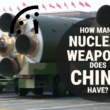Diagnosis: Tlatelolco-itis
By Bharat Karnad, July 25, 2014
The Round One essays by my colleagues Héctor Guerra and Rodrigo Álvarez Valdés indicate that they suffer from a malady identifiable as Tlatelolco-itis—a tendency to overlook those features of the Tlatelolco Treaty that indicate it is not a practical basis for universal disarmament. And both men seem to use the treaty as the cornerstone for their thinking about a world sans nuclear weapons. (Guerra, admittedly, never mentions the treaty, but his overall outlook on disarmament seems consistent with Tlatelolco-itis.)
The Treaty for the Prohibition of Nuclear Weapons in Latin America and the Caribbean, otherwise known as the Tlatelolco Treaty, has freed Latin American peoples from the existential dangers involved in nuclear competition, but the treaty and its regime are fortunate to have survived the nuclear frictions that once characterized relations between Brazil and Argentina. Beyond this, the treaty’s establishment was prompted (in the main) by the 1962 Cuban Missile Crisis—but was politically possible due only to an overarching security architecture maintained by the United States throughout the Western Hemisphere. That is, US security commitments in the region assuaged the fears, harbored by many signatory states, that communism would spread through Latin America (partly from its Soviet outpost in Cuba). Whether they like it or not, members of the Tlatelolco Treaty still fall today within the protective ambit of the United States. Thus their status relative to nuclear weapons remains, in effect, no different from that of non-nuclear weapon states within NATO. Any claim that Latin America has no truck with nuclear weapons is therefore disingenuous.
Neither Guerra nor Álvarez acknowledges any of this. Indeed, Álvarez argues that nuclear-weapon-free zones, banded together, might provide a basis for global disarmament. He concedes that such an approach is unlikely to succeed—but doesn’t acknowledge that even the original nuclear-weapon-free zone (Tlatelolco) is organized around an implicit nuclear security guarantee. Neither Guerra nor Álvarez makes any suggestion that the United States, the United Kingdom, and France (the three extraterritorial nuclear weapon states that possess territory in Latin America) dispose of their nuclear weapons unconditionally—that the three states disarm before other nuclear-armed nations do so. But how, otherwise, can the region truly be considered free of nuclear weapons?
Guerra, moreover, admits that established mechanisms to advance disarmament, such as the UN Conference on Disarmament, have "suffered some failures" and that nuclear weapons technology has spread. He nonetheless regards the "ban the bomb" initiative as a means of sensitizing the world to the perils of these weapons—though the danger is already recognized all too well. Meanwhile, Guerra sees the humanitarian initiative as something to "cut through the clutter that surrounds nuclear disarmament," by which he means the incremental, stepwise approach of the Conference on Disarmament. Problematically, though, he believes that the treaties established to prohibit antipersonnel landmines and cluster munitions can show the way toward nuclear disarmament. But the Ottawa and Oslo processes toward eliminating those two classes of weapons were not nearly as fraught as are negotiations over nuclear weapons. And in any case, antipersonnel mines and cluster munitions are akin to poison gas—peripheral to the security of states and therefore amenable to a ban.
Finally, Guerra argues that “foreign policy principles, practice, and accumulated experience” are “closely intertwined” with “disarmament processes.” But foreign policy principles, practice, and experience are also a function of disputed borders, long-running conflicts, and nations’ need to deter wars—and, if compelled to do so, fight them—through both conventional and nuclear military means. To build a case for disarmament on any other premise, as Guerra does, is to seek simplistic solutions to an infernally complex problem.
Topics: Nuclear Weapons
Share: [addthis tool="addthis_inline_share_toolbox"]














